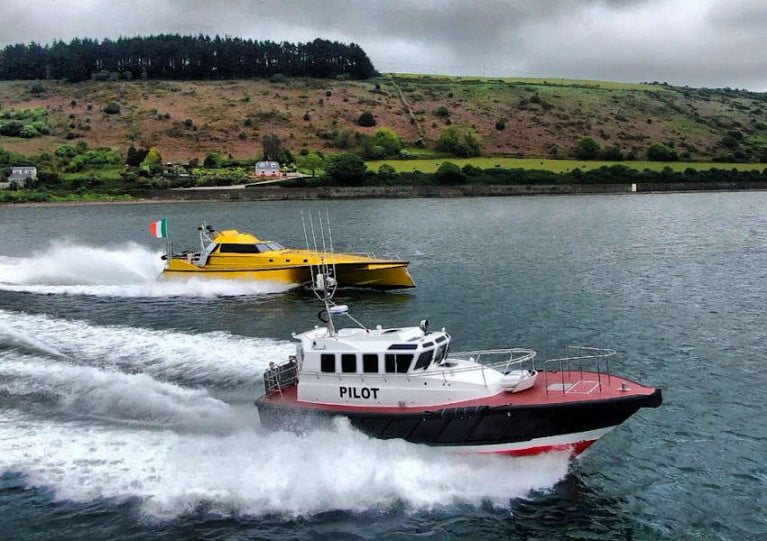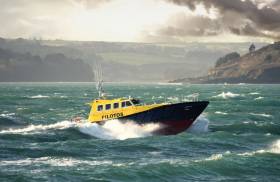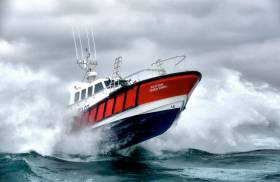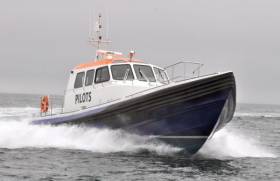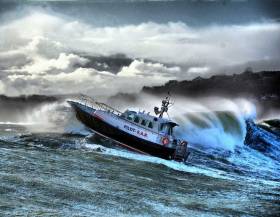Displaying items by tag: Pilot Boats
Safehaven Marine’s Latest Pilot Boat for Uruguay Braves the Elements in Rough Weather Sea Trials
Cork’s Safehaven Marine have just launched a new Interceptor 48 pilot boat as the second of a two-boat contract with the MVD Pilots Association in Montevideo, Uruguay.
Ederra 7 follows Ederra 6 which was delivered to Uruguay this past July. The boat recently underwent rough sea weather trials off Roches Point during a gale, captured by drone in the video below.
As the performance boat builder says, this kind of testing against the elements is about “ensuring she’s well up to the task of an all-weather pilot boat” before shipping to South America in late November.
Safehaven Marine has emerged from ‘lockdown’ with the launch of its new pilot boat for the Port of San Ciprian in Spain.
The Cork-based performance boat specialists put production on pause at the end of March, following strict Government restrictions on movement against coronavirus.
Almost completed at the time was the Interceptor 42 order for the fishing port in north-western Spain.
But as Safehaven tweeted yesterday, the boat is finally on the water for initial sea trials as the country begins its gradual reopening.
Safehaven Marine made the deal with the Spanish port — along with orders for Coruna, and Leixoes in Portugal — over a year ago, and more news is expected from the boatyard in the coming weeks.
Another recent delivery delayed by Covid-19 restrictions is an Interceptor 38 to the Port of Berbera in Somaliland, which was received in mid April.
Great to launch a new pilot boat for the Port of San Ciprian in Spain after nearly 2 months of Lockdown. She was nearly finished at the start of the lockdown and it was nice to be on the water again, even with social distancing @AfloatMagazine @LarryCpix @captainbob76 @MaryP972 pic.twitter.com/QqsEwhP31t
— Safehaven Marine (@SafehavenMarine) May 19, 2020
Safehaven Marine Makes Deal With Two Spanish Ports After Latest Pilot Boat Delivery to Portugal
Following delivery of their latest pilot boat for the Port of Leixoes in Portugal, the Cork Harbour performance boat specialsts at Safehaven Marine announced the signing of contracts with two Spanish ports.
The port of San Ciprian has contracted for an Interceptor 42 pilot vessel while the larger Port of Coruna to the south-west has commissioned an Interceptor 48 pilot. Both are to be delivered in mid 2020.
Safehaven Marine says its pilot craft have proven very popular in the Iberian Peninsula.
Once these latest commissions are delivered — and the ports of Gijon and Algeciras begin undertaking pilot transfers with their own Interceptors — Safehaven will have 14 pilot boats working in the peninsula.
Both new contracts were signed simultaneously after pilots from Coruna and San Ciprian were impressed by sea trials of the new Leixoes pilot, named Lada, on delivery last month.
Safehaven Marine’s Latest Pilot Boat ‘Svitzer Oued Rmel’ Put To The Test In Cork Harbour
Safehaven Marine has shared a video clip of sea trials and self-righting testing on its latest Interceptor 48 pilot vessel in Cork Harbour.
Oued Rmel is the first of a two-boat contract with marine services company Svitzer and has been built for operations out of the new TM2 Port in Tangier, Morocco.
The vessel has a positive stability curve to 180 degrees, capable of recovering if capsized by a large breaking wave in the busy shipping lanes of the Mediterranean.
Self-righting test and rough weather sea trials of ‘Svitzer Oued Rmel’ our Interceptor 48 All weather pilot vessel @corkharbour @PortofCork @CorkHarbourWX @RandomCorkStuff @CorkCoast @Coast_Monkey @AfloatMagazine @KENNYTCORK @Deeshocks @captainbob76 @MaryP972 @barrabest pic.twitter.com/TXXTNtqnJi
— Safehaven Marine (@SafehavenMarine) April 4, 2018
Work on the second vessel, a pilot boat for Malta, has been under construction at Seahaven’s Cobh boatyard since late last year, as previously reported on Afloat.ie.
#PilotBoats - Belfast Harbour has completed its £2 million deal with Redbay Boats for two new pilot boats to service the city’s busy waterfront, as The Irish News reports.
Already on service is the Captain Michael Evans named after the Belfast’s former deputy harbour master who was killed in the Manx2 Flight 7100 crash in Cork in 2011.
It’s now been joined by the Ben Madigan — also a Stormforce 1650, a new design by Redbay Boats based in Cushendall, Co Antrim, and celebrating 40 years in business this year.
The Irish News has more on the story HERE.
Safehaven Marine has signed a deal with offshore support contractor Svitzer to provide two new Interceptor 48 pilot boats for operation at the new TM2 port terminal at Tangier in Morocco.
The two 15m vessels, due for delivery in October 2018, are to be ‘all-weather capable’ and as such are self-righting, with an operational speed of 25 knots and built to a very high specification with a fully climate controlled cabin enabling comfortable transits for 8 personnel, all on shock mitigation seating.
These vessels will be the 12th and 13th Interceptor 48s produced by the Cork Harbour-based extreme performance boatbuilder, which most recently launched an Interceptor 48 last November when the P&O Cypria entered service in Limassol.
Since then the company has seen the launch of a Barracuda pilot boat at Poole in the UK, and two new boats for Spain — an Interceptor 38, Calaneras, at Algeciras, and the Interceptor 42 Vigia for the port of Gijón which was put through its paces in rough weather trials last month.
Safehaven is also the designer and builder of Thunder Child, which started its high speed trials in May ahead of its round-Ireland record attempt this summer.


























